Zapping Microwave Electrical Woes: Your | Ultimate Troubleshooting Guide

Microwave electrical issues can range from minor inconveniences to major malfunctions. This comprehensive guide walks you through common problems like power loss, failure to start, heating issues, sparking, turntable troubles, light outages, and strange noises. Learn expert troubleshooting techniques, essential safety precautions, and when to seek professional help. Keep your microwave running smoothly with our easy-to-follow tips and tricks.
Zapping Microwave Electrical Woes: Your Ultimate Troubleshooting Guide
Microwaves may seem like magical boxes that transform cold leftovers into piping-hot meals in minutes. But in reality, it is a complex machine with complex inner workings. So it can be worrying when there are electrical issues with it.
Fortunately, there might be some DIY solutions to this and we’re going to explore all of them. When the issue is beyond that though, you need to call a professional.
From silent standoffs to sparking spectacles, we’ll unravel the mysteries behind common electrical issues plaguing these modern marvels. So, grab your metaphorical multimeter, and let’s dive into the heart of microwave mayhem!
Your fridge is a kitchen superstar as it keeps all your food fresh and drinks cold.
But does the fridge feel warm when you open it?
Is there water all over the floor?
Fridge issues are the worst!
No Power, No Problem
Picture this: You’re ready to nuke that day-old pizza, but your microwave sits there, dark and unresponsive. Before you panic, let’s play microwave detective:
- Check the obvious: Is it plugged in?
- Test the outlet with another appliance – maybe it’s not your microwave’s fault.
- Investigate the circuit breaker – it might have tripped during last night’s popcorn marathon.
- Inspect the power cord for sneaky damage
- Examine the door switches
If these steps don’t resurrect your appliance, it might be time to call in a professional. CLT Appliance Repair specializes in bringing microwaves back from the brink!
The Stubborn Start
Your microwave has power, but it might have some issues too. Here’s how to negotiate:
- Ensure the door is fully closed and latched
- Test those door switches again
- Give the control panel a once-over
If your microwave still won’t budge, don’t force it. Reaching out to CLT Appliance Repair could save you from a potential kitchen calamity!
All Spin, No Heat
The lights are on, but nobody’s home in the heat department. Time to investigate the high-voltage suspects:
- The magnetron
- High voltage capacitor
- High voltage diode
Testing these components requires specialized knowledge and tools. Unless you’re an electrical wizard, it’s best to leave this to the pros at CLT Appliance Repair.
Sparks and Arcs: Taming the Inner Lightning
Sparks in your microwave are never a good sign. Before you call the fire department, check for:
- Rogue metal objects such as metals or foil
- Damaged waveguide cover
- Chipped interior paint – even tiny imperfections can cause big sparks.
If the light show persists, power down immediately and contact CLT Appliance Repair. They’ll ensure your microwave doesn’t turn into an accidental fireworks display!
Turntable Troubles
A stationary turntable can lead to unevenly heated food. Here’s how to get things moving:
- Inspect the turntable, drive motor, and coupler for visible damage
- Ensure the turntable is properly seated on its track
- Give the turntable a gentle spin by hand – it should move freely
If the turntable refuses to budge, CLT Appliance Repair can diagnose and fix the issue quickly.
Lights Out
Don’t let a burnt-out bulb leave you in the dark:
- Check if the bulb is simply loose or blown
- Test those pesky door switches once more
- Inspect the wiring leading to the light
Replacing a microwave light bulb can be trickier than it looks. When in doubt, let the appliance experts at CLT Appliance Repair light the way!
Noisy Nuisances
Is your microwave making weird sounds? Unusual noises could indicate:
- Turntable components in distress
- A magnetron on its last legs
- A cooling fan crying for help
- Loose parts having a party inside your appliance
Don’t ignore these sounds – they’re your microwave’s way of calling for help! Contact CLT Appliance Repair to restore peace to your kitchen.
Safety First: Precautions for DIY Repairs
Before you channel your inner electrician, remember:
- Always unplug the microwave before investigating
- Discharge the high-voltage capacitor if you’re venturing inside
- Use insulated tools to avoid shocking surprises
- Never operate the microwave with its cover removed
Your safety is paramount. When in doubt, step back and call the experts!

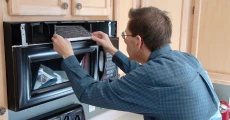
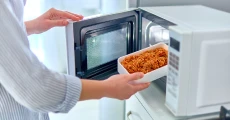
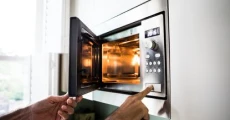
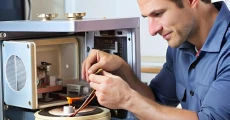
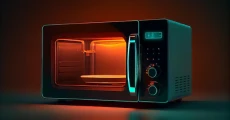


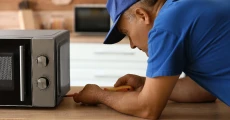
Know When to Call the Pros?
While the DIY spirit is admirable, some issues require professional expertise:
- Anything involving high-voltage components
- Electrical problems beyond simple part replacements
- When you feel uncomfortable or uncertain about the repair
In conclusion, understanding common microwave electrical issues can save you time, money, and potential hazards. By following these troubleshooting tips, you can often diagnose the problem and sometimes even fix it yourself.
However, when faced with complex issues or safety concerns, don’t hesitate to reach out to the professionals at CLT Appliance for microwave repair charlotte nc. They’ll ensure your microwave is back to zapping leftovers and popping popcorn in no time!
FAQs
This could be due to a faulty door switch, a shorted power cord, or a malfunctioning magnetron. If it happens repeatedly, unplug the microwave and contact a professional for safety.
A low hum is normal during operation. However, loud buzzing or grinding noises could indicate a problem with the magnetron or turntable motor and should be checked by a technician.
While it’s possible, cooking without a turntable can lead to uneven heating. It’s best to have a functioning turntable for optimal cooking results.
On average, a microwave can last 9-10 years with proper care and maintenance. Regular cleaning and avoiding overloading can extend its lifespan.
No, never use a microwave with a faulty door. This can lead to microwave energy leakage, which is potentially harmful. Have it repaired immediately.
Don't let a malfunctioning Microwave disrupt your daily life. Contact CLT Appliance Repair today at 704-606-9043 to schedule your oven repair service.
We'll have your Microwave back to optimal performance in no time!
Freezer Repair Indian Land SC | Freezer Repair Indian Trail NC | Freezer Repair Pineville NC | Freezer Repair Rock Hill SC | Freezer Repair Belmont NC | Freezer Repair Matthews NC | Freezer Repair Lancaster SC | Freezer Repair Cornelius NC | Freezer Repair Fort Mill SC | Freezer Repair Concord NC | Freezer Repair Denver NC | Freezer Repair Monroe NC | Freezer Repair Mooresville NC | Freezer Repair Harrisburg NC | Freezer Repair Lake Wylie SC | Freezer Repair Huntersville NC | Freezer Repair Kannapolis NC | Freezer Repair Mint Hill NC | Freezer Repair Waxhaw NC | Freezer Repair Troutman NC | Freezer Repair Davidson NC | Freezer Repair Gastonia NC | Freezer Repair Charlotte NC

